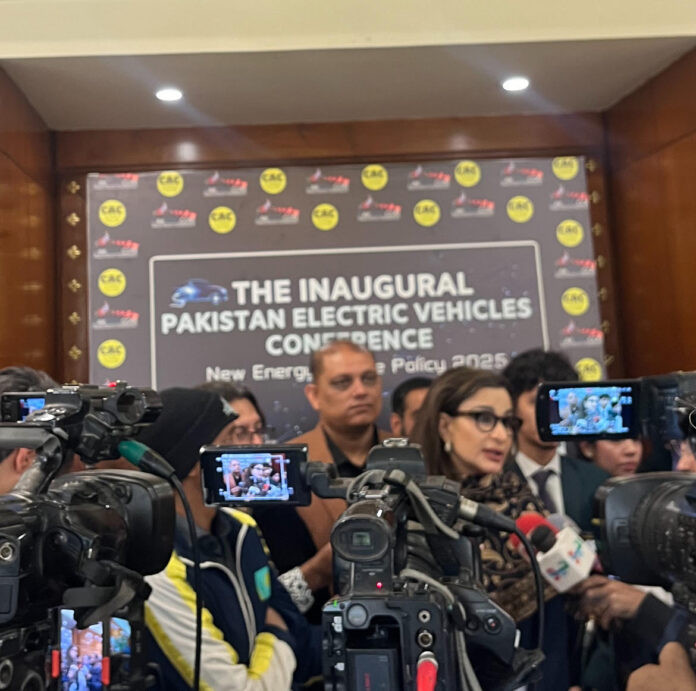Climate Action Centre and Pakistan EV Oversight hosted the inaugural pakistan electric vehicles conference on Saturday, 21st December at Avari Towers in Karachi. This conference aimed to organise key stakeholders of the EV industry to ‘align policies and financial frameworks with the industry’s growth aspirations’ amid the upcoming Energy Vehicle Policy, 2025.
The Chief Guest of the Event was Senator and Chair of the Standing Committee on Climate Change, Sherry Rehman. In her keynote address, she noted the number of motor vehicles will double in the next 10 years. She insisted that pollution is a local problem, and that local stakeholders need to organise to mitigate its effects.
Zafar Masud, the President of Bank of Punjab, was the Guest of Honour, who delivered a presentation regarding EV financing, in the context of consumers and projects.
The panel discussions at the conference highlighted critical challenges and opportunities in the EV industry, emphasizing the need for public-private partnerships to address financing gaps, local manufacturing incentives, and effective policies.
Experts called for banking incentives to combat vehicle emissions, which significantly contribute to urban pollution, while showcasing successful business-driven solutions like Indrive’s electrification initiatives. Concerns were also raised about the Energy Vehicle Policy 2025 favouring imports over local production, underscoring the importance of aligning policies with industry growth and environmental goals.
Panel discussions and key insights:
The conference heard from 2 panels. The first discussed EV financing policy, and was moderated by Dr Aazir Khan from the University of Lahore. The panel included Rabeel Warraich, a Shark Tank Pakistan investor and Founder and CEO of Sarmayacar. Zafar Masud and the CEO of Bank Al Baraka, Muhammad Atif Hanif, also joined this panel conversation, along with the Director of LUMS energy institute, Dr Naveed Arshad, who is one of the authors of the new EV policy.
It was recently unveiled that Sarmayacar has recently raised a $15m pledge for its climate fund. Warraich noted how the combination of a venture-backed approach to climate justice can produce impact as well as potential return for the investor.
The panel acknowledged the need for creating necessary for the EV industry to solve critical challenges. Masud highlighted that 40% of Lahore’s smog is due to vehicle emissions. While recent CAC figures indicate that accounting for 60% of pollution in Karachi and 80% in Lahore, it was clear that a commitment and unilateral effort from across the private sector is required.
The second panel focused on industry and innovation, and was moderated by Bilal Hussain from Business Recorder. The panellists included Kashif Riaz, the Director of Dewan Motors, as well as the GM Corporate Affairs of Atlas Honda, Sadullah Ejaz. There was also representation from InDrive and Mehran Auto Parts on the panel.
It was highlighted how beyond policy and investment, a switch to electric has been an option that is ‘good for business’, as Indrive in Islamabad has electrified at least 100 of its 2-wheeler fleet, in a partnership with EZbike, and by incentivising this conversion through its partnership with Kalpay.
Riaz further highlighted how the daily wages of people will increase as a Rs3000 fuel cost is replaced with a Rs900 cost of electricity. However it was also noted that such initiatives should exceed just 1 private company, and how policy should be focused on making it happen.
This panel emphasised the role of local manufacturing in Pakistan, and how that should be incentivised, for the sake of exports. While the recent draft of the policy, reported by Dawn, highlighted that the draft placed an emphasis on imports, it is unclear if the public-sector has engaged with these concerns of local manufacturers.
According to the report, Pakistan Automotive Manufacturers Association raised concerns about the import of completely built units (CBU) at a reduced duty structure compared to completely knocked down units, as it could harm the local industry.
Representatives of BYD and KIA, who are currently importing their EV’s as CBU’s, were not present at the conference despite their names being on the guest list.




